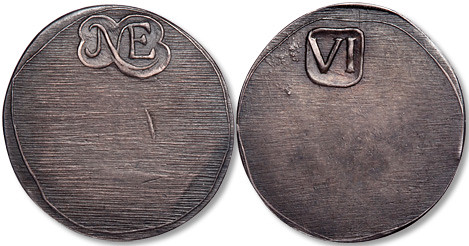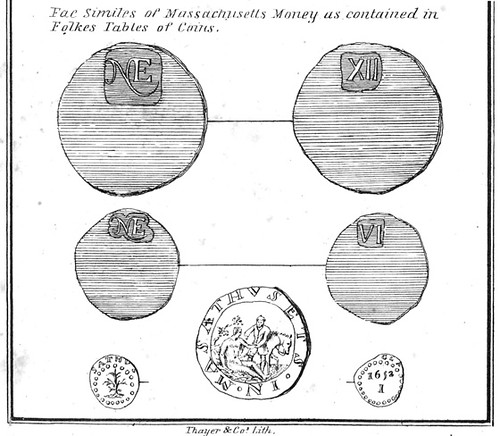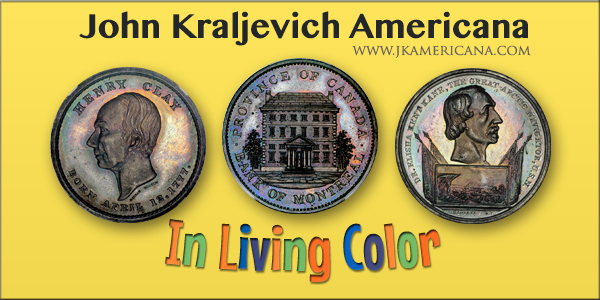
PREV ARTICLE
NEXT ARTICLE
FULL ISSUE
PREV FULL ISSUE
FELT PLATE IMAGES USED TO MAKE WYATT COPIES
A couple weeks ago we had an article about the interesting 1850s-era struck copies of U.S. colonial coins created by Thomas Wyatt. Based
on illustrations in a book, the copies included the cross-hatching lines found in the illustrations, and not on the coins themselves.
Looking for images of the book illustrations these reproductions were based on, I found this article by David Sundman on the Littleton
Coin Company web site. -Editor

The second example of a NE sixpence shown above has a very curious story. Beginning in the 1850s, coin collecting in the United States grew greatly in popularity. Rarities could only be owned by a few collectors. So it was not surprising that several enterprising individuals decided to create their own imitations of rarities for sale to collectors. Some were sold as copies at reasonable prices, and some no doubt were fraudulently offered to collectors as genuine pieces. With only a couple of numismatic references of any note published, and with few illustrations and no photographs, it was easy pickings for the fraudulently inclined. The best-known examples today were those copies made in New York City by Thomas Wyatt and later by Edwin Bolen – to whom Wyatt sold the dies. These activities happened long before today's Hobby Protection Act, enacted in 1973 and requiring the word COPY to be placed on all imitation pieces. If you compare the Wyatt copy to the photo of the genuine coin, you'll note the curious horizontal lines on the copy. What are they, and why would a person making a copy put them on the copy when they aren't on the original? As mentioned above, there were no photos of coins in books during these early days of U.S. numismatics. With very few examples of the rare New England coinage known, the copyist likely did not have access to the genuine article. The next best thing were the facsimile images of "Pine Tree Money" and New England coinage published in An Historical Account of Massachusetts Currency by Joseph B. Felt [1839]. The line images were roughly modeled after the images from Plate XXX in the 1745 book, A Table of English Silver Coins, by Martin Folkes of the Society of Antiquaries of London [January, 1745]. 
The Thomas Wyatt copies do not resemble the NE coinage images in Martin Folkes' earlier 1745 work published in London. Thomas Wyatt's copies are known to have existed as early as June 1856. He reportedly made a dozen copies of eight different early colonials and marketed them as sets of 8 different denominations of Massachusetts currency. These included some "copies" of coins that are really fantasies – for which genuine coins are non-existent. Newspaper accounts from Boston as early as 1856 mention their "discovery" in an old bottle, and their subsequent purchase "by a gentleman to be presented to the British Museum." Not shown here but worth noting: the most expensive collectable copies of the NE coinage are contemporary counterfeits made in the 1650s. A few do exist, and when sold today, they can bring tens of thousands of dollars at auction from knowledgeable collectors. To read the complete article, see:
To read the earlier E-Sylum articles, see:

Wayne Homren, Editor The Numismatic Bibliomania Society is a non-profit organization promoting numismatic literature. See our web site at coinbooks.org. To submit items for publication in The E-Sylum, write to the Editor at this address: whomren@gmail.com To subscribe go to: https://my.binhost.com/lists/listinfo/esylum All Rights Reserved. NBS Home Page Contact the NBS webmaster 
|